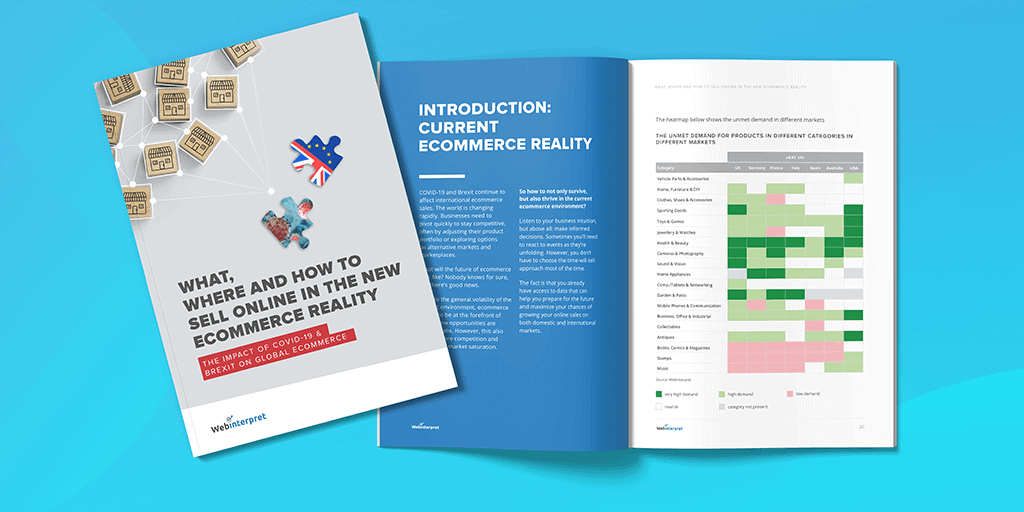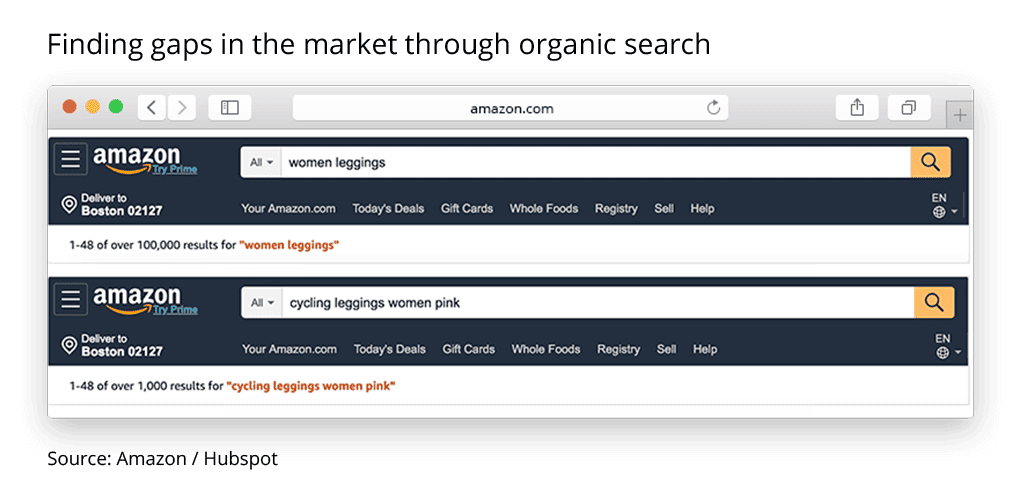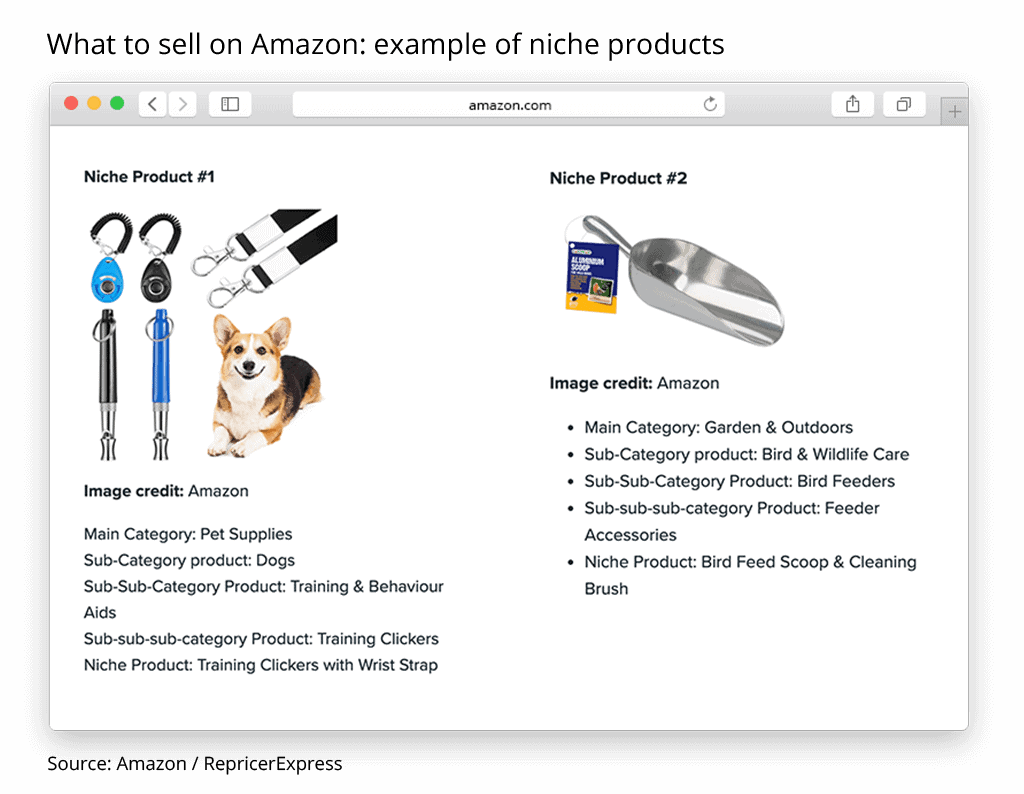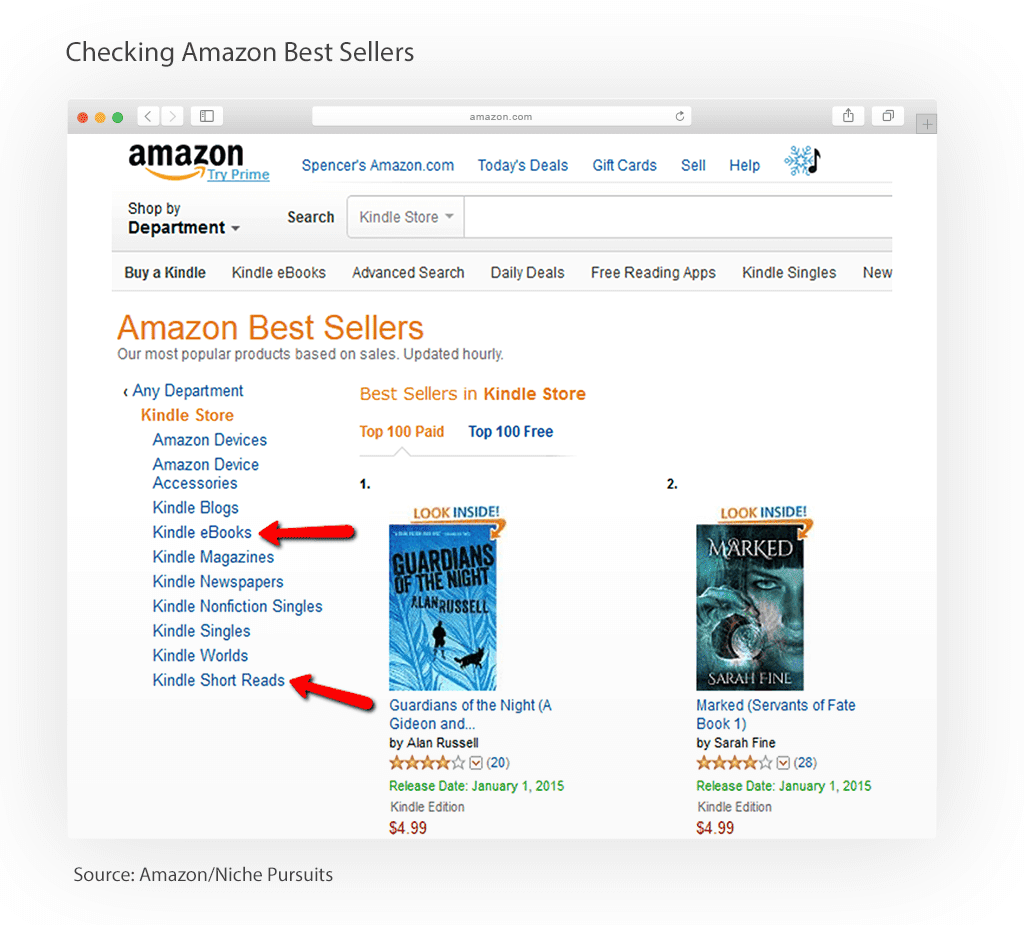Listing top selling products on Amazon can be very profitable: if you know what to sell, when to sell and how to pinpoint this.
In this post you’ll learn about:
- Amazon’s best sellers for 2022
- Best sellers and profitable niches on Amazon KDP
- Ways to identify the ever-changing top selling items
- How to maximize your chances of selling what shoppers truly intend to buy on Amazon and other marketplaces.
Now: no time to waste, let’s dig in!
Download our FREE practical guide and checklist for easier reading and sharing with coworkers. Learn what to sell on eBay and Amazon in 2022!

Click the links below to go directly to the topic of your interest:
Top selling items on Amazon in 2022
Top selling products based on Amazon best sellers page
Product research software
What to sell on Amazon: criteria
Top selling items on Amazon (FBA): selling niche products
Best sellers on Amazon KDP
Top selling items on Amazon in 2022
First, when we talk about the top-selling items on Amazon, this doesn’t necessarily mean you should sell these specific products. Your final call will depend on multiple factors, for example competition, demand in the markets you sell, your specific business situation and so on.
Probably no strategy will guarantee you’ll pick a best seller every time. In fact, you may need to experiment with a few different items. Furthermore, any time you’re looking to add new products, you should research the market to ensure the product will still be in demand by the time you get set up.
All the same, your endeavour should pay off.
In general, the following categories have sales potential on Amazon:
- Toys & Games
- Electronics
- Camera & Photo
- Video Games
- Books: consistently some of the best selling items, especially ebooks sold via the Kindle store
- Clothing, Shoes & Jewelry
- Handmade
- Pet Supplies
- Home & Kitchen.
You may want to avoid some categories like CD & Vinyl due to music streaming services that are causing sales for these products to drop dramatically.
The information we’ve covered thus far can already provide you with some inspiration. Still, to help you maximize your chances of getting it right, we’ll need to dig deeper.
FREE Download: AI seller tools for marketplace sellers
Top selling products based on Amazon best sellers page
A good starting point for identifying top selling items on Amazon is a list of current best-sellers (“our most popular products based on sales”) that the platform itself curates. You can find best seller lists for international marketplaces, including the USA, the UK, Canada, Spain or Germany.
These lists show items that are selling the most across the entire site. They show the most popular products per category, ranging from toys to books to video games.
Amazon’s Best Seller list is updated hourly. Check out the screenshot below to see what was popular at the time when we started working on this article in March.

However, when using Amazon’s best seller lists, be aware that:
- Products found on the best sellers page can be very competitive: after all, every seller has access to this information.
- Sales of particular products might be trending down, which means you could jump in just as the product stops being in high demand.
- Some top selling products might not have great sales margins and be profitable.
All the same, we encourage you to pay attention to what sells best and is trending. You might want to get ideas for similar products and also look at the “Customers also bought” section. This can give you ideas to adjust your product portfolio in a way that will grow your ecommerce business on unprecedented levels.
When you’ve identified products with potential, you can track down suppliers that will provide you with those same products or come up with new variations to gain competitive advantage.
Want to sell more on marketplaces after Covid-19? Download our FREE report!

Top selling items on Amazon: product research software
Pinpointing top selling products is more complicated than simply looking at Amazon’s best seller list. It’s just the first step and a way to gather ideas. Unfortunately, it’s impossible to find all the relevant information there.
The fact is that you need a more scientific approach. You need to know the stats behind each product before you decide to invest in it:
- What are its average monthly sales?
- How many other people are selling it?
- What is its average price, average reviews or sales history?
- What kind of sales margins can you expect?
- Are its sales trending up or down?
As a consequence, consider using third party product research tools that can show you this information, for example AMZScout’s Product Database and Pro Extension.
https://youtube.com/watch?v=_G9pks_GjGM%3Ffeature%3Doembed%26enablejsapi%3D1%26origin%3Dhttps%3A
What to sell on Amazon: criteria
When you’re about to choose products you want to sell on Amazon:
#1. Look at the top selling products for each category and find trending products.
#2. Go for items with high demand (or some demand): an item doesn’t have to be selling massive amounts per day. However, at a minimum, any product you plan to sell should achieve at least 10 sales per day.
#3. Avoid being too trendy or seasonal so you have consistent sales throughout the entire year. Selling products in demand 24/7/365 will help you achieve sustainable growth.
#4. Avoid picking heavily-saturated markets, consider international markets.
#5. Find a niche with consistent demand: in general, buyers often don’t just ‘browse’ on Amazon, but look for something specific, e.g. “Cookbooks for instant pot cooking” is more specific than “Cookbooks”. You can use a chrome extension to research products in a niche market, e.g. Jungle Scout to see monthly sales volumes on products or products with low competition.
#6. Consider products with low competition that could indicate an untapped market (selling products with big-name brands can mean too much competition). There might be high demand for a product, but not many sellers are offering it. Why not swoop in and offer a really good version of that item?
#7. Leverage existing product reviews, e.g. the number of reviews could indicate how often a product has been purchased or how long a product / listing has been up. A small number of reviews that are in the 4-5 star range could mean that that product is emerging as a top seller (there’s potential and likely little competition).
#8. Consider products that are inexpensive to acquire/make.
#9. Test product quality before you invest. Check samples from your suppliers. This is extra important on Amazon FBA.
#10. Pick products that are easy to ship: be careful about items that are fragile, breakable, perishable or prone to damage.
#11. Learn about shipping costs and Amazon seller fees so you can narrow your decision, e.g. a two-pound item will be lightweight and easy to ship, which can help lower your shipping fees.
#12. Consider creating your own brand. Private label products can be less expensive to purchase compared to big names so you can make more profit on them. You also have control over how you market and present the product (however, you still need to design your own logo, packaging and build a customer base).
Ecommerce tip
Check out the actual content of product reviews, e.g. what people like and don’t like about it so you can sell your own version that will resonate with customers even more.
Finally, research top sellers on other marketplaces for further clarification and to identify product gaps. For instance, check out top selling items on eBay.
What to sell on Amazon FBA
Regarding what to sell on Amazon FBA, it’s crucial to remember that it’s a ‘price-driven’ marketplace. This means that people visit the website to find the best deal. Thus, your products must be attractive to your target audience and often in a particular price range.
When it comes to Amazon FBA businesses, the criteria for the products you choose to sell remain the same as when you sell on Amazon and manage and ship orders yourself.
What to sell on Amazon FBA: product criteria
- Usually it’s better to avoid selling well-known or designer-branded products. Most Amazon buyers are interested in decent products that come at a good price.
- Listing products under your own brand name and offering something a little extra, e.g. faster shipping, can put you ahead of your competitors.
- Choosing small and lightweight products will save you extra storage fees in the case of slow-selling items. Plus, the bigger and heavier the product, the higher the shipping costs.
- Choose uncomplicated products so you avoid potential customer issues.
- Some goods, e.g. foods, toys, batteries or beauty products, may require certifications or paperwork that may be challenging and frustrating to obtain.
Additionally, consider a selling price between £10 and £50. Products you list and sell below £10 are unlikely to make you a decent profit unless you sell in huge volumes. Products above £50 have potential for more profit, but fewer shoppers may be interested in them.
Products selling for less than £50 are usually within the ‘impulse buy’ price range. Between £10 and £50 should be “cheap enough” for buyers to make a quick decision. This means that they probably won’t need to think very hard about making the purchase.
The most popular categories on Amazon tend to be:
- Apparel (Clothing and Accessories)
- Beauty
- Baby
- Books
- Electronics
- Fitness
- Garden & Outdoors
- Health
- Home & Kitchen
- Jewellery
- Toys.
7 ecommerce shipping practices: FREE Download
Top selling items on Amazon (FBA): selling niche products
Consider narrowing down your research to a point where the product you’re about to sell is so specific that competition is drastically reduced. This way you should only attract serious buyers and your product should be easier to find for people searching for it, too.
If you don’t have a niche yet, start with the basics:
- What are the most-searched for keywords on Amazon?
- Which products are most successful?
- What’s the demand for the product and the level of competition?
- What are the expected sales margins?
Additionally, find a gap in the market through simple organic search. For instance, typing in “women leggings” may have over 100,000 results (competitive) compared to the more specific “cycling leggings women pink”. Many people may already be selling leggings, but there might be a certain style, color or type of leggings that is missing on the site.

You can also find a gap in the market by reading customer reviews in your product market niche. You might discover that customers are unsatisfied by the current brands and want something you can provide or think of providing.
Ecommerce tip
If you already have a product in mind or a certain category you focus on, be careful about going for everything under the sun. For instance, if you sell in the automotive field, suddenly starting to sell face masks may not be optimal, especially when people trust you as an authority in your niche.
What to sell on Amazon (FBA): example of niche products
Take pet supplies. This is a popular category, yet many sellers will offer standard dog training aids. Thus, consider narrowing it down to very specific training aids, e.g. the clicker and then possibly even further to clickers with a wrist strap, for instance.

Best sellers on Amazon KDP
When it comes to Amazon Kindle Direct Publishing (KPD), Amazon’s self-publishing platform, The following niches have a lot of sales potential.
Holidays niche
It offers lots of sales potential when it comes to seasonal events, e.g. Christmas, Hanukkah, Valentine’s Day, Easter, Mother’s Day, etc.
Entrepreneurship / small business niche
Small business owners are interested in keeping themselves organized, disciplined and motivated. Consider niching down by focusing on the type of business, e.g. a hair salon, event planner, tech start-up.
Gaming niche
Selling video games is popular, but be careful about copyright protected designs.
Sports niche
Some sports niches are saturated, but there are different sports out there: winter sports, tennis, baseball, basketball, cricket, soccer, hockey, table tennis, gymnastics or figure skating. Keep in mind that designs for specific teams or athletes will be covered under copyright.
Personal development niche
This niche can help make a difference in people’s lives. However, as it’s saturated, it’s important to niche down.
Frontline workers niche
A new niche that has gained a lot of attention during the pandemic. Potential front line workers include nurses, doctors, public transport workers, grocery store workers, teachers and postal service workers.
Crafting niche
Crafting grew in popularity during the pandemic. A few types of crafting niches: crochet, knitting, quilting, beadwork, woodwork, origami, painting.
Food / cooking / baking niche
Baking grew in popularity during the pandemic as well, especially bread making.
Travel lovers niche
There are limitless ideas in this niche. For example, consider making designs for every city, country, state, continent and so on. It can be about traveling by plane, boat, train, road tripping, traveling solo, with friends, etc.
Nature lovers niche
This includes environmentalists, plant lovers, avid hikers or wilderness lovers. Some sub-niches include: plants, trees, cacti, camping, gardening, hiking, mountains, eco friendly, wild animals.
Floral niche
Consider a floral niche in general or niching down, for example: lilies, daisies, sunflowers, tulips, chrysanthemums, carnations, roses.
Vegetarian / vegan niche
When choosing this niche, you can consider people’s reasons for eating a plant-based diet, e.g. health / environmental reasons or animal rights.
Typography niche
You can design books with inspirational sayings, monograms, quotes, single words and so on. If you use quotes/sayings, they need to be either in the public domain or you need to acquire the proper license. Be careful about copyrights.
Music niche
You can narrow it down, for example by musicians, by lovers/listeners of music, by instrument if you are targeting musicians or by targeting a specific music genre, e.g. rock, metal, punk, country, pop. Make sure everything that you produce is copyright-free and above board.
Back-to school-niche
You can target a specific grade, age, etc.
Religion niche
You can use inspiring and/or meaningful quotes (assuming copyright laws allow for it).
Mysticism / spirituality niche
This could be crystals, tarot, archangels, reiki, meditation and so on.
Pride / LGBT / queer positive niche
This is a saturated niche, but there are many ways you can be unique to stand out in this niche.
Fantasy / sci-fi niche
Here you can get carried away: magic, unicorns, dragons, castles, fairies, elves, aliens and much more!
Selling low content books on Amazon
Low content books contain little to no text or images. Often they’re not complicated to make, but can quickly become best sellers.
Examples of low content books
Notebooks, memo books, squared paper notebooks, balance sheet notebooks, journals and different kinds of planners.
When selling low content (or any content on Amazon KDP), check out Amazon best sellers and do proper niche and keyword research.
Here are examples of keywords for describing notebooks: diary, journal, pad, binder, daybook, workbook, log book or memo book.

Top selling items on Amazon: conclusion
Top-selling products on Amazon change regularly and there’s no fool-proof recipe for getting it right every time. However, the criteria for deciding what to sell on the platform remain the same.
Offering products of value is more important than ever. Thus, offer unique, budget-friendly products with minimal competition to truly succeed on Amazon.
Amazon is competitive so it’s smart to ensure you’re truly able to offer something of value.


